She grew up in an Apurinã community deep in the forest — territory Brazilians call the “aldeia” — and has since made a life for her family in the poorer neighbourhoods of this city of over two million.
“In the aldeia you have rights. In the city you have no rights,” explained Apurinã.
But Apurinã has a secret weapon in her fight for the dignity and survival of her people in the city. Her daughter Jean Menendes runs a school called Wainhamary where she teaches urban Indigenous children the secrets of their own culture, especially the language their grandparents spoke.
“We’re looked down on in the city,” said Apurinã.
Marshalling community support for her daughter’s semi-official school and mentoring her daughter’s teaching career has been a way of lifting up her people and her culture against Brazilian indifference, ignorance and even disdain.
Indigenous kids in the city often absorb contempt for Indigenous culture from the surrounding city population, resulting in higher rates of suicide, drug addiction, illiteracy and criminal involvement. Once kids know their own language, they know themselves in a new way, said Apurinã.
“Each language is a particular way of understanding life and our reality,” explains Fr. Ron MacDonell of the Toronto-based Scarboro Missions. “Language is tied in with culture and identity, hence it is important for Indigenous peoples all over the world.”
As a linguist who has devoted more than 25 years to helping people of the Amazon retain and recover their languages, MacDonell has supported Menendes and her school over the years with teaching strategies and practical advice.
Sitting in the classroom, going over the books and posters Menendes uses with her students, MacDonell is bursting with pride and delight as he sees how effectively she has used his own techniques for stimulating dialogue among language-learners.
In a room decorated with Apurinã ideograms, symbols and pictures, Menendes doesn’t limit herself to teaching vocabulary, grammar and sentence structure. The language is one key to unlocking the culture.
“I teach about the clans,” she explained.
She has collected traditional stories, legends and myths and uses them to expand her students’ understanding of their language. Each question a student asks about Apurinã traditions leads to another bit of the language and each word learned unveils another part of the culture.
Elaborate myths and laws governing marriage or the origins and uses of plants and animals might not directly apply to an Indigenous child growing up in Manaus, but knowing them amounts to knowing family origins and history.
Manaus city Indigenous school inspector Silvanira Matos would like to print a classroom set of Menendes’ book of collected Apurinã myths, but there’s no money in the city budget for that. It would cost the equivalent of $40.
Matos sees schools like Wainhamary as absolutely essential to the future of the city and of individual Indigenous students.
“Of course the children have to go to regular school, to live in a globalized world,” she said. “But it’s important that they don’t lose their culture.”
The working document for the Synod on the Amazon mentions languages 19 times. More than being a conference on biodiversity and ecology, Pope Francis hopes the synod will recalibrate the Church’s relationship with Indigenous culture — in the Amazon, in Canada and everywhere.
“I consider it essential to begin creating institutional expressions of respect, recognition and dialogue with the native peoples, acknowledging and recovering their native cultures, languages, traditions, rights and spirituality,” Pope Francis said as he met with Indigenous leaders in Peru in January of 2018, discussing his plans for the synod.
“The Church is not alien to your problems and your lives. ... We need the native peoples to shape the culture of the local churches in Amazonia.”
The synod falls during the United Nations International Year of Indigenous Languages. Linguists count between 5,000 and 6,000 living languages in the world today. By the end of this century, 90 per cent of them will be dead, according to some experts. The dead languages will mostly be Indigenous.
It’s hard to distinguish killing off a language from killing off a culture, said MacDonell.
“Language is part of people’s culture. If people in the Amazon, or anywhere, lose their language — if a people stop speaking their language — then what makes them that particular ethnic identity?” MacDonell asks.
Every language lost is a lost opportunity to praise God, a lost expression of God’s love for the world, he said.
“It’s more the sin of omission, that people are not doing enough to protect them,” said MacDonell. “First, they have to become aware and to create that interest and excitement around their languages.”


